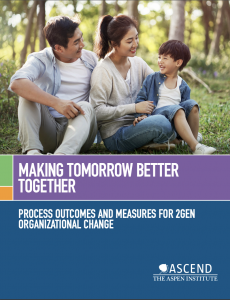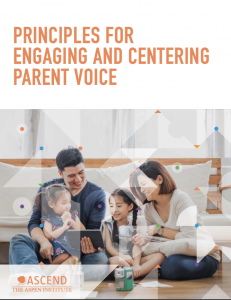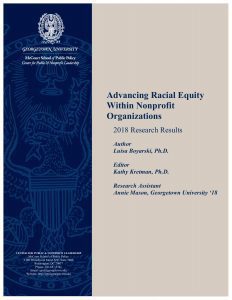These principles are foundational values embedded in two-generation (2Gen) approaches.

1. Measure and account for outcomes for both children and the adults in their lives
While subsequent principles are important for all strategies, the distinguishing factor of the 2Gen approach is the focus on whole families. Programs and policies should measure outcomes at multiple levels – for individuals, key family relationships (parent-child, co-parents), and families as a whole – to yield a complete picture of how families are faring and the effectiveness of 2Gen approaches. It’s important we learn more about interim outcomes (like client trust and hope) and the effects of interim outcomes on long-term outcomes (like a child’s education progress or a family’s income).
Northwestern University, Institute for Policy Research
The Northwestern University Two-Generation Research Initiative (NU2Gen) develops and evaluates programs which strategically align education services for children and youth with workforce training and postsecondary education for their parents.
Dr. Teresa Eckrich Sommer — a research professor at the Institute for Policy Research at Northwestern University — studies the dual development of parents and children and the social mobility of families.


Colorado Family Resource Centers
The Colorado General Assembly established Family Resource Centers (FRCs) in 1993 as a “single point of entry for providing comprehensive, intensive, integrated, and collaborative community-based services for vulnerable families, individuals, children, and youth” in local communities. For over a decade, Family Resource Center Association (FRCA) has used the Colorado Family Support Assessment© (CFSA 2.0) which assesses family well-being in multiple areas to conduct annual evaluations of their services and impact across Colorado.
In the Colorado Family Resource Center’s 2022-2023 Evaluation report, FRCA families demonstrated statistically significant growth in the health and economic self-sufficiency. On the CFSA 2.0, the prevention line is used to distinguish an in-crisis or vulnerable situation from one that is safe, stable, or thriving. Across all families, the greatest share of families moving from below to above the prevention line was in housing (18%), employment (15%), child care (15%), debt management (13%), food security (13%), and cash savings (10%).
Making Tomorrow Better Together: Process Outcomes and Measures for 2Gen Organizational Change
The purpose of this guidebook is to help organization and agency leaders set goals and develop measures to track their progress and achievement of 2Gen change. The introduction begins with definitions of key terms used throughout the guidebook, then provides a brief history of the 2Gen approach and describes lessons learned that inform today’s “2Gen 2.0” efforts. It continues with discussions of the 2Gen continuum of policy and systems change, the role of organizational change in achieving parent and child outcomes, and stages of organizational collaboration.


2. Engage and listen to the voices of families
Parents/adult caregivers are the experts when it comes to what their families need to thrive and the ways in which 2Gen approaches may or may not be meeting those needs. Their perspectives and experiential wisdom should be embedded in the design of 2Gen approaches, in their implementation, and in the generation of evidence for those approaches.
Los Angeles Valley College Family Resource Center
A key tenant for Los Angeles Valley College Family Resource Center is that no two student-parents share the exact same background or experience. They meet with their student parents on an individual basis in order to evaluate what existing services and resources might be available. In addition, they use a survey campaign that seeks to understand how to remove access barriers and increase student parent use of institutional supports for which they are eligible.
Amber Angel — a former Adjunct Instructor and 2020 Ascend Parent Advisor — shares the importance of harnessing the power of parents as decision makers and thought partners.
Head Start- Best Practices in Family & Community Engagement Video Series
The Best Practices in Family and Community Engagement Video Series is designed to support each program’s efforts toward systemic and integrated engagement. Rooted in the Office of Head Start (OHS) Parent, Family, and Community Engagement (PFCE) Framework, the videos highlight examples of innovative approaches to engagement that foster strong relationships with families and lead to positive outcomes for children and families.
Principles for Engaging and Centering Parent Voice
Over the last decade, Ascend has worked with and learned from more than 50 parents across the country. Our learnings have demonstrated the importance of intentionality when lifting and centering parent perspectives, as well as connecting with parents themselves to gain their expertise and knowledge. From this journey, we developed a set of eight principles intended to guide interactions with parents and create the best possible conditions to work with parents and center their voices in 2Gen programs, policies, systems, and research.


3. Ensure racial, gender, and economic equity
2Gen approaches prioritize equity so that all children and all families can thrive and have the same opportunity to reach their potential. These strategies should evaluate and fix structural problems that create gender and/or racial and ethnic disparities in all aspects – from programs and services to day-to-day operations to relationships with families.
Washington State Department of Social and Health Services
This department is tied together by a single mission: to transform lives.
Dr. Lori Pfingst — a Senior Director and 2018 Ascend Fellow — oversees the state’s social benefit programs and supports efforts to reduce poverty and increase intergenerational well-being for kids and families. She describes how 2Gen strategies and partnerships can help address inequities so families can reach their full potential.
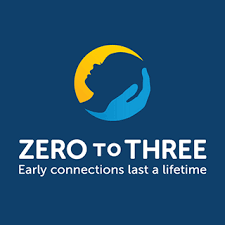

ZERO to THREE manages a resource library of videos, articles, and training aimed at antiracist parenting, anti-bias training for early childhood educators, and equitable advocacy for policymakers.
Advancing Racial Equity within Nonprofit Organizations: 2018 Research Results
The Center for Public and Nonprofit Leadership at Georgetown University presents research findings on how nonprofit organizations are advancing racial equity within their boards and staff. This report shares specific activities, replicable models, recommended resources, and practical advice for organizations looking to advance their racial equity work.


4. Foster innovation and evidence together
Tap insights from prior evidence-based research and build a deliberate pipeline to ensure innovation. Policies and organizational cultures should encourage the integration of innovation into emerging evidence and evaluations of effectiveness.
The Center for Urban Families has an unwavering focus on addressing the key challenges of Baltimore’s urban families by working to connect fathers to their children, creating opportunities for economic and financial security through work, and providing access to other key interventions and supportive services.
Joe Jones — a Founder & CEO and 2018 Ascend Fellow — offers insights into how to build organizational cultures that test new strategies learning and adapting in real time.
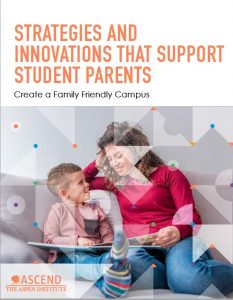

Principles for Engaging and Centering Parent Voice
Investment in resources that improve the experience of students who are parents will improve the college experience for all students.


5. Align and link systems and funding streams
Rarely will single funding streams fully address all the needs of children, parents, and families. Programs will need to blend and coordinate funds to deliver two-generation services. Aligning and linking systems at the state and community level — eligibility standards, performance benchmarks, and coordinated administrative structures — while simultaneously pursuing improved outcomes for both parents and children will lead to 2Gen success.
Administration for Children and Families (ACF)
Mishaela Duran, Director for the Administration for Children and Families (ACF) Office of Regional Operations, discusses the importance of coordinating across systems to serve whole families.
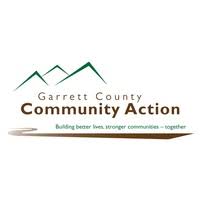

Garrett County Community Action
For human services work, first impressions often begin with client intake. Intake processes give organizations an opportunity to start their interactions with families with a two-generation (2Gen) approach. Garret County Community Action Committee (GCCAC), a leading 2Gen organization in rural western Maryland, has designed its intake process to ensure a 2Gen approach from the very beginning of its partnership with families.
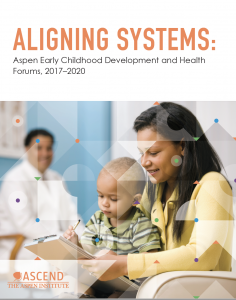

Aligning Systems: Aspen Early Childhood Development and Health Forums, 2017-2020
The brief provides an overview of lessons learned and new innovations to inform and support a comprehensive early childhood system and advance federal efforts to align early childhood and health systems in order to strengthen family outcomes across agencies. It was informed by a series of convenings that gathered early childhood policy, practice, and funding leaders to discuss and advance local, state, and federal systems that impact children, families, and two-generation health and development.

